|
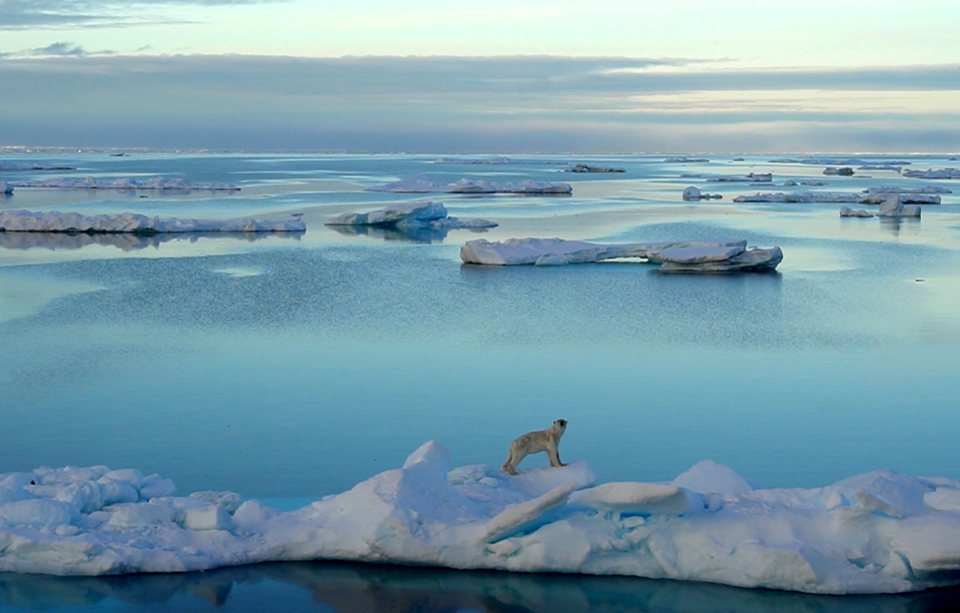 It’s a hot topic, considering that ice is involved. With Arctic coastlines quickly eroding, a team of UW researchers has received $1 million from the National Science Foundation’s Office of Polar Programs to investigate how the interactions of waves, sea ice and the ocean affect coastal flooding. Focusing on the northern coast of Alaska, where coastlines are quickly eroding at rates of meters per year, CEE faculty researchers Jim Thomson and Nirnimesh Kumar will study the impact of reduced sea ice on ocean waves and the subsequent effects on shorelines. These processes can exacerbate coastal flooding as the ocean distance over which the wind blows increases, and powerful waves are generated. The researchers plan to create an open-source modeling system to inform strategic climate policy decisions. It’s a hot topic, considering that ice is involved. With Arctic coastlines quickly eroding, a team of UW researchers has received $1 million from the National Science Foundation’s Office of Polar Programs to investigate how the interactions of waves, sea ice and the ocean affect coastal flooding. Focusing on the northern coast of Alaska, where coastlines are quickly eroding at rates of meters per year, CEE faculty researchers Jim Thomson and Nirnimesh Kumar will study the impact of reduced sea ice on ocean waves and the subsequent effects on shorelines. These processes can exacerbate coastal flooding as the ocean distance over which the wind blows increases, and powerful waves are generated. The researchers plan to create an open-source modeling system to inform strategic climate policy decisions.
|
|
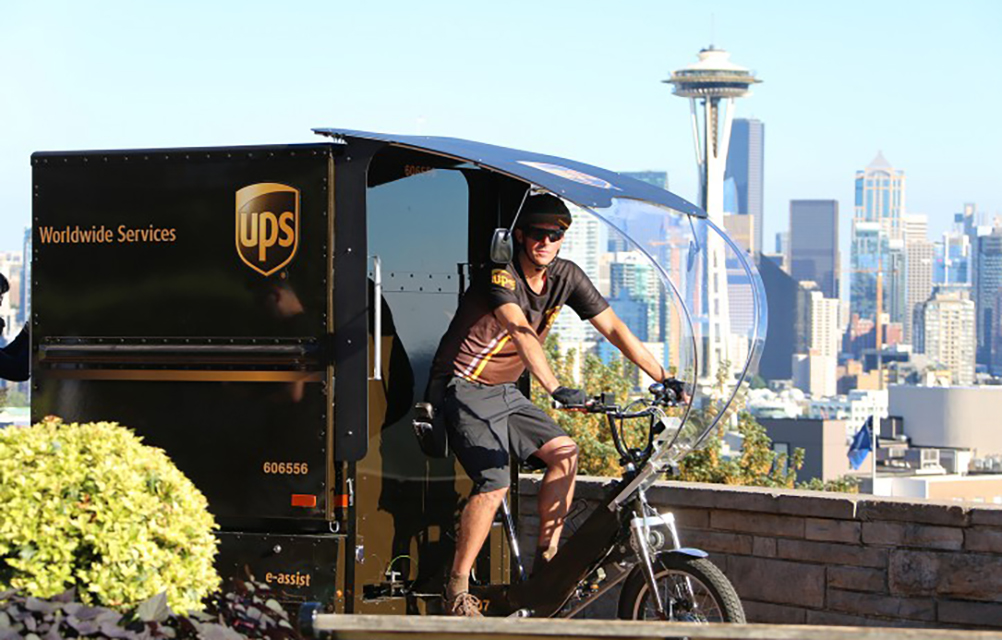 Seattle is one of the most congested cities in America, in part due to delivery trucks taking up space on crowded streets. To help remedy this, UPS will be pilot-testing deliveries with cargo e-bikes in downtown Seattle. To assess the success of the program, CEE researchers in the Supply Chain Transportation and Logistics Center’s Urban Freight Lab will be involved in evaluating the study’s outcomes. UPS has pilot-tested e-bike delivery systems all over the world since 2012. For the Seattle pilot test, UPS will use modular, detachable boxes for the first time, which can carry up to 400 pounds and can be presorted according to neighborhood or route. The e-bikes will operate on sidewalks and in designated bike lanes in the downtown Seattle area. Seattle is one of the most congested cities in America, in part due to delivery trucks taking up space on crowded streets. To help remedy this, UPS will be pilot-testing deliveries with cargo e-bikes in downtown Seattle. To assess the success of the program, CEE researchers in the Supply Chain Transportation and Logistics Center’s Urban Freight Lab will be involved in evaluating the study’s outcomes. UPS has pilot-tested e-bike delivery systems all over the world since 2012. For the Seattle pilot test, UPS will use modular, detachable boxes for the first time, which can carry up to 400 pounds and can be presorted according to neighborhood or route. The e-bikes will operate on sidewalks and in designated bike lanes in the downtown Seattle area.
|
|
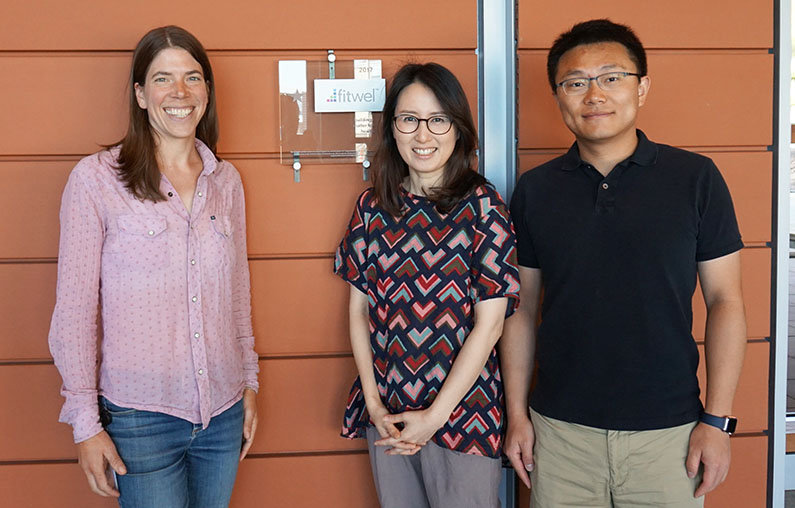 Considering that most people spend one-third of their day at work, UW CEE researchers are advocating for healthier buildings. And they aren’t wasting any time. The first government building in Puget Sound, Bellevue City Hall, recently gained Fitwel Certification thanks to guidance from assistant professor Amy Kim and post-doc Shuoqi (Stanley) Wang. One of the leading certifiers of healthy buildings in the United States, Fitwel encourages the adoption of more than 60 strategies that encourage healthy behavior of building occupants. Bellevue City Hall enhancements included adding signage to encourage occupants to increase physical activities in the building, standing desks and ergonomic furniture, green purchasing policies, improving lactation rooms and distributing green cleaning kits to improve indoor air quality. Considering that most people spend one-third of their day at work, UW CEE researchers are advocating for healthier buildings. And they aren’t wasting any time. The first government building in Puget Sound, Bellevue City Hall, recently gained Fitwel Certification thanks to guidance from assistant professor Amy Kim and post-doc Shuoqi (Stanley) Wang. One of the leading certifiers of healthy buildings in the United States, Fitwel encourages the adoption of more than 60 strategies that encourage healthy behavior of building occupants. Bellevue City Hall enhancements included adding signage to encourage occupants to increase physical activities in the building, standing desks and ergonomic furniture, green purchasing policies, improving lactation rooms and distributing green cleaning kits to improve indoor air quality.
|
|
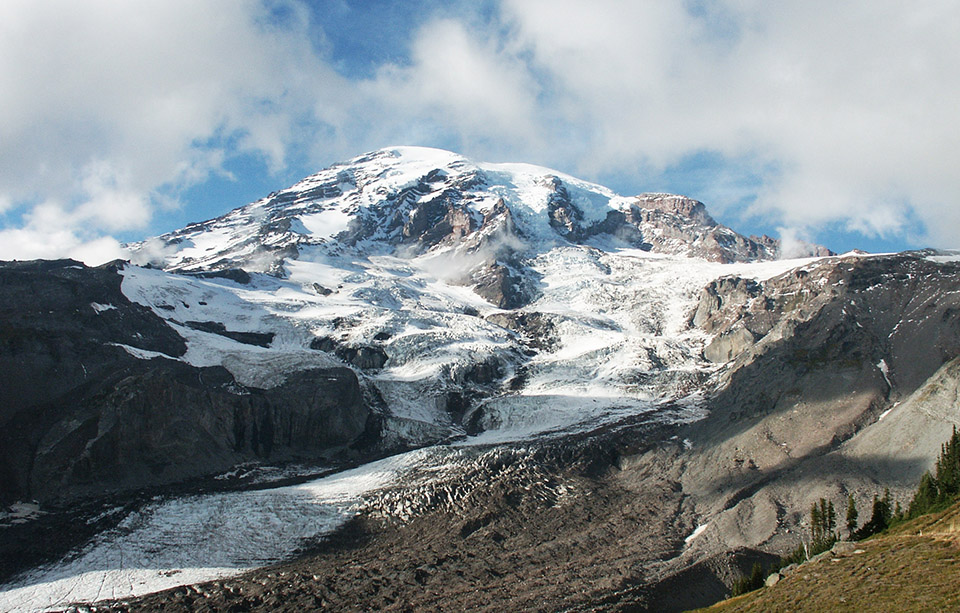 In light of global warming, more glaciers means more melting. And for the Pacific Northwest, which is home to the most glaciers in the contiguous 48 states, that also means increased vulnerability. For the first time, a team of researchers including CEE alumnus Chris Frans and associate professor Erkan Istanbulluoglu has evaluated the hydrological impact of receding glaciers in the region. Their findings revealed that the rate of regional glacier recession will continue to increase. Lower-elevation basins will suffer, as smaller snowpack and the shrinkage of small glaciers will result in continued reductions in summer streamflow during the dry season. River volumes could be reduced by 80% due to decreases in both glacier and snow melt by the end of the century. In light of global warming, more glaciers means more melting. And for the Pacific Northwest, which is home to the most glaciers in the contiguous 48 states, that also means increased vulnerability. For the first time, a team of researchers including CEE alumnus Chris Frans and associate professor Erkan Istanbulluoglu has evaluated the hydrological impact of receding glaciers in the region. Their findings revealed that the rate of regional glacier recession will continue to increase. Lower-elevation basins will suffer, as smaller snowpack and the shrinkage of small glaciers will result in continued reductions in summer streamflow during the dry season. River volumes could be reduced by 80% due to decreases in both glacier and snow melt by the end of the century.
|
|
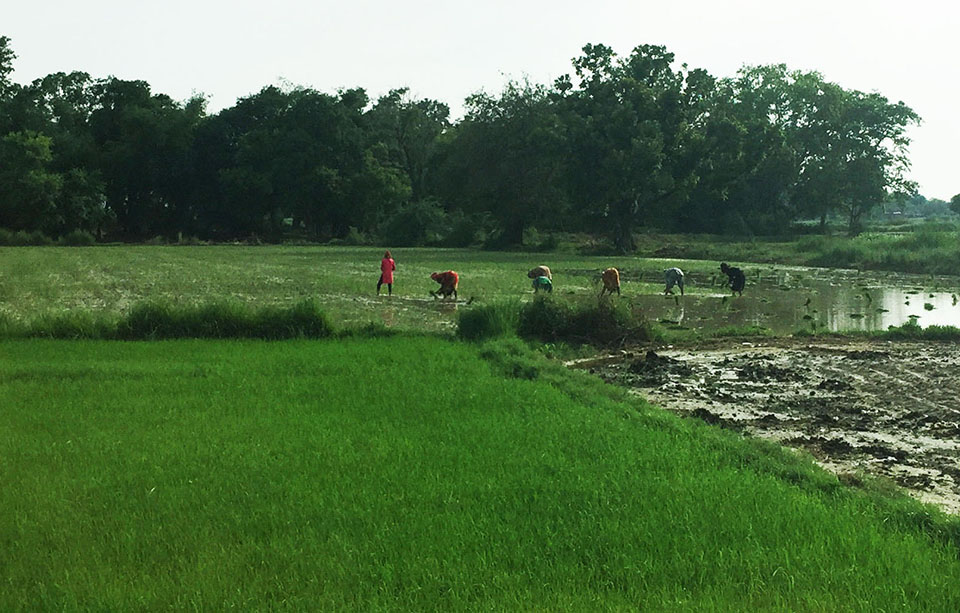 From cucumbers to sunflowers to rice, farmers in India grow an assortment of crops. While variety is a good thing, farmers struggle with knowing how much water various crops require. As a result, crops are often over or under watered, which reduces crop yield. Unable to provide for themselves, many of India’s 140 million farmers are leaving the profession at an epidemic rate. To empower India’s struggling farmers, UW CEE researchers are developing an irrigation advisory system called the Advisory for Necessary Irrigation system. The system utilizes satellite and weather model data combined with information gathered via low-power ground sensors and geographic data to generate irrigation advisories, which can be sent to farmers via mobile phone. From cucumbers to sunflowers to rice, farmers in India grow an assortment of crops. While variety is a good thing, farmers struggle with knowing how much water various crops require. As a result, crops are often over or under watered, which reduces crop yield. Unable to provide for themselves, many of India’s 140 million farmers are leaving the profession at an epidemic rate. To empower India’s struggling farmers, UW CEE researchers are developing an irrigation advisory system called the Advisory for Necessary Irrigation system. The system utilizes satellite and weather model data combined with information gathered via low-power ground sensors and geographic data to generate irrigation advisories, which can be sent to farmers via mobile phone.
|
|
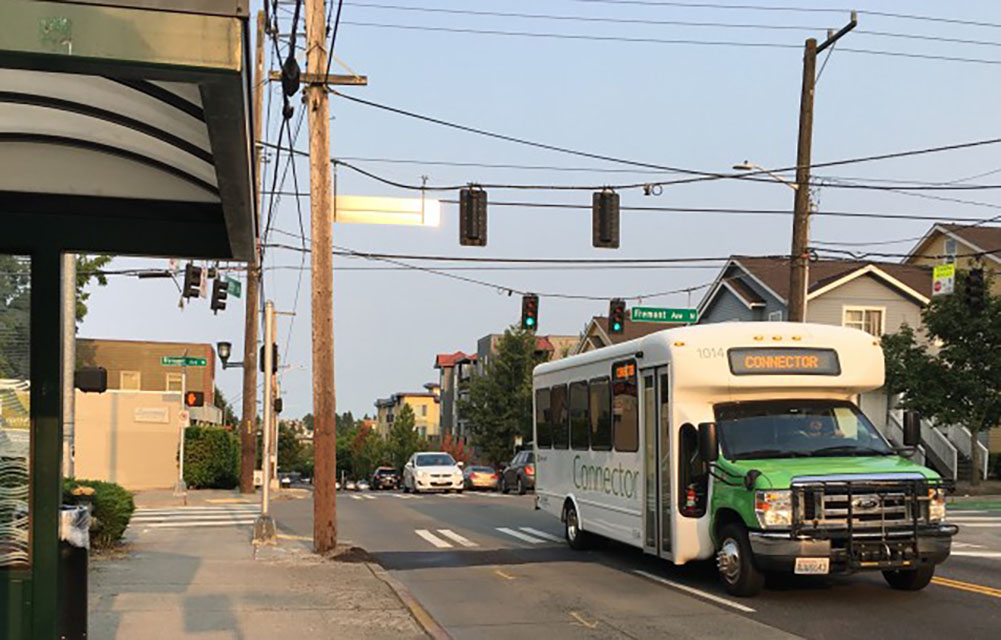 While many Puget Sound residents choose between taking public transit or personal vehicles to work, Microsoft and Seattle Children’s Hospital employees have an additional option: private commuter buses. Last year, King County Metro and the Seattle Department of Transportation started a pilot program that allowed these shuttles to pick up employees at a few public bus stops throughout the city. Although some residents are concerned that sharing stops with private shuttles could make public transit less reliable, a recent study by assistant professor Don MacKenzie and graduate student Elyse Lewis shows otherwise. The study suggests that public buses are unaffected by private shuttles the majority of the time. While many Puget Sound residents choose between taking public transit or personal vehicles to work, Microsoft and Seattle Children’s Hospital employees have an additional option: private commuter buses. Last year, King County Metro and the Seattle Department of Transportation started a pilot program that allowed these shuttles to pick up employees at a few public bus stops throughout the city. Although some residents are concerned that sharing stops with private shuttles could make public transit less reliable, a recent study by assistant professor Don MacKenzie and graduate student Elyse Lewis shows otherwise. The study suggests that public buses are unaffected by private shuttles the majority of the time.
|
|
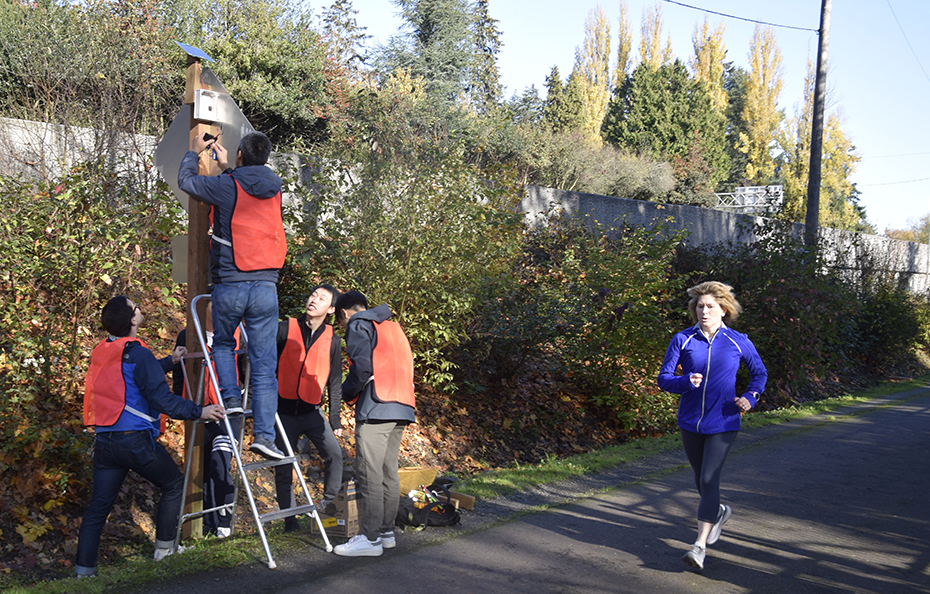 Crossing the street may not seem like a dangerous activity. However, almost every 90 minutes a pedestrian is killed and every eight minutes a pedestrian is injured in the United States, according to the National Highway Traffic Safety Administration. To help keep pedestrians safe, a team of STAR Lab researchers is building a new type of communications system that connects various roadway users and sends safety warnings to both pedestrians and drivers, alerting them of potential conflicts in their oncoming path. The system can be used at conflict-prone locations, such as busy intersections. Led by professor Yinhai Wang, the research team includes postdoctoral researcher Ziqiang Zeng, Ph.D. student Yifan Zhuang and Ph.D. student Ziyuan Pu. Called the Smart Road Sticker (SRS), the technology consists of a small, solar-energy powered device that acts as a hub to facilitate communication between roadway users. Installed on light poles or other infrastructure near the roadway, the basic function of the SRS is to detect mobile devices that have the STAR Detection App installed. The app enables people to receive safety notifications, warning them of hazards such as a driver who has failed to stop at an intersection. This fall, the researchers are testing the system by installing SRS devices on the Burke-Gilman Trail in Lake Forest Park. Crossing the street may not seem like a dangerous activity. However, almost every 90 minutes a pedestrian is killed and every eight minutes a pedestrian is injured in the United States, according to the National Highway Traffic Safety Administration. To help keep pedestrians safe, a team of STAR Lab researchers is building a new type of communications system that connects various roadway users and sends safety warnings to both pedestrians and drivers, alerting them of potential conflicts in their oncoming path. The system can be used at conflict-prone locations, such as busy intersections. Led by professor Yinhai Wang, the research team includes postdoctoral researcher Ziqiang Zeng, Ph.D. student Yifan Zhuang and Ph.D. student Ziyuan Pu. Called the Smart Road Sticker (SRS), the technology consists of a small, solar-energy powered device that acts as a hub to facilitate communication between roadway users. Installed on light poles or other infrastructure near the roadway, the basic function of the SRS is to detect mobile devices that have the STAR Detection App installed. The app enables people to receive safety notifications, warning them of hazards such as a driver who has failed to stop at an intersection. This fall, the researchers are testing the system by installing SRS devices on the Burke-Gilman Trail in Lake Forest Park.
|
 It’s a hot topic, considering that ice is involved. With Arctic coastlines quickly eroding, a team of UW researchers has received $1 million from the National Science Foundation’s Office of Polar Programs to investigate how the interactions of waves, sea ice and the ocean affect coastal flooding. Focusing on the northern coast of Alaska, where coastlines are quickly eroding at rates of meters per year, CEE faculty researchers Jim Thomson and Nirnimesh Kumar will study the impact of reduced sea ice on ocean waves and the subsequent effects on shorelines. These processes can exacerbate coastal flooding as the ocean distance over which the wind blows increases, and powerful waves are generated. The researchers plan to create an open-source modeling system to inform strategic climate policy decisions.
It’s a hot topic, considering that ice is involved. With Arctic coastlines quickly eroding, a team of UW researchers has received $1 million from the National Science Foundation’s Office of Polar Programs to investigate how the interactions of waves, sea ice and the ocean affect coastal flooding. Focusing on the northern coast of Alaska, where coastlines are quickly eroding at rates of meters per year, CEE faculty researchers Jim Thomson and Nirnimesh Kumar will study the impact of reduced sea ice on ocean waves and the subsequent effects on shorelines. These processes can exacerbate coastal flooding as the ocean distance over which the wind blows increases, and powerful waves are generated. The researchers plan to create an open-source modeling system to inform strategic climate policy decisions. Seattle is one of the most congested cities in America, in part due to delivery trucks taking up space on crowded streets. To help remedy this, UPS will be pilot-testing deliveries with cargo e-bikes in downtown Seattle. To assess the success of the program, CEE researchers in the Supply Chain Transportation and Logistics Center’s Urban Freight Lab will be involved in evaluating the study’s outcomes. UPS has pilot-tested e-bike delivery systems all over the world since 2012. For the Seattle pilot test, UPS will use modular, detachable boxes for the first time, which can carry up to 400 pounds and can be presorted according to neighborhood or route. The e-bikes will operate on sidewalks and in designated bike lanes in the downtown Seattle area.
Seattle is one of the most congested cities in America, in part due to delivery trucks taking up space on crowded streets. To help remedy this, UPS will be pilot-testing deliveries with cargo e-bikes in downtown Seattle. To assess the success of the program, CEE researchers in the Supply Chain Transportation and Logistics Center’s Urban Freight Lab will be involved in evaluating the study’s outcomes. UPS has pilot-tested e-bike delivery systems all over the world since 2012. For the Seattle pilot test, UPS will use modular, detachable boxes for the first time, which can carry up to 400 pounds and can be presorted according to neighborhood or route. The e-bikes will operate on sidewalks and in designated bike lanes in the downtown Seattle area. Considering that most people spend one-third of their day at work, UW CEE researchers are advocating for healthier buildings. And they aren’t wasting any time. The first government building in Puget Sound, Bellevue City Hall, recently gained Fitwel Certification thanks to guidance from assistant professor Amy Kim and post-doc Shuoqi (Stanley) Wang. One of the leading certifiers of healthy buildings in the United States, Fitwel encourages the adoption of more than 60 strategies that encourage healthy behavior of building occupants. Bellevue City Hall enhancements included adding signage to encourage occupants to increase physical activities in the building, standing desks and ergonomic furniture, green purchasing policies, improving lactation rooms and distributing green cleaning kits to improve indoor air quality.
Considering that most people spend one-third of their day at work, UW CEE researchers are advocating for healthier buildings. And they aren’t wasting any time. The first government building in Puget Sound, Bellevue City Hall, recently gained Fitwel Certification thanks to guidance from assistant professor Amy Kim and post-doc Shuoqi (Stanley) Wang. One of the leading certifiers of healthy buildings in the United States, Fitwel encourages the adoption of more than 60 strategies that encourage healthy behavior of building occupants. Bellevue City Hall enhancements included adding signage to encourage occupants to increase physical activities in the building, standing desks and ergonomic furniture, green purchasing policies, improving lactation rooms and distributing green cleaning kits to improve indoor air quality. In light of global warming, more glaciers means more melting. And for the Pacific Northwest, which is home to the most glaciers in the contiguous 48 states, that also means increased vulnerability. For the first time, a team of researchers including CEE alumnus Chris Frans and associate professor Erkan Istanbulluoglu has evaluated the hydrological impact of receding glaciers in the region. Their findings revealed that the rate of regional glacier recession will continue to increase. Lower-elevation basins will suffer, as smaller snowpack and the shrinkage of small glaciers will result in continued reductions in summer streamflow during the dry season. River volumes could be reduced by 80% due to decreases in both glacier and snow melt by the end of the century.
In light of global warming, more glaciers means more melting. And for the Pacific Northwest, which is home to the most glaciers in the contiguous 48 states, that also means increased vulnerability. For the first time, a team of researchers including CEE alumnus Chris Frans and associate professor Erkan Istanbulluoglu has evaluated the hydrological impact of receding glaciers in the region. Their findings revealed that the rate of regional glacier recession will continue to increase. Lower-elevation basins will suffer, as smaller snowpack and the shrinkage of small glaciers will result in continued reductions in summer streamflow during the dry season. River volumes could be reduced by 80% due to decreases in both glacier and snow melt by the end of the century. From cucumbers to sunflowers to rice, farmers in India grow an assortment of crops. While variety is a good thing, farmers struggle with knowing how much water various crops require. As a result, crops are often over or under watered, which reduces crop yield. Unable to provide for themselves, many of India’s 140 million farmers are leaving the profession at an epidemic rate. To empower India’s struggling farmers, UW CEE researchers are developing an irrigation advisory system called the Advisory for Necessary Irrigation system. The system utilizes satellite and weather model data combined with information gathered via low-power ground sensors and geographic data to generate irrigation advisories, which can be sent to farmers via mobile phone.
From cucumbers to sunflowers to rice, farmers in India grow an assortment of crops. While variety is a good thing, farmers struggle with knowing how much water various crops require. As a result, crops are often over or under watered, which reduces crop yield. Unable to provide for themselves, many of India’s 140 million farmers are leaving the profession at an epidemic rate. To empower India’s struggling farmers, UW CEE researchers are developing an irrigation advisory system called the Advisory for Necessary Irrigation system. The system utilizes satellite and weather model data combined with information gathered via low-power ground sensors and geographic data to generate irrigation advisories, which can be sent to farmers via mobile phone. While many Puget Sound residents choose between taking public transit or personal vehicles to work, Microsoft and Seattle Children’s Hospital employees have an additional option: private commuter buses. Last year, King County Metro and the Seattle Department of Transportation started a pilot program that allowed these shuttles to pick up employees at a few public bus stops throughout the city. Although some residents are concerned that sharing stops with private shuttles could make public transit less reliable, a recent study by assistant professor Don MacKenzie and graduate student Elyse Lewis shows otherwise. The study suggests that public buses are unaffected by private shuttles the majority of the time.
While many Puget Sound residents choose between taking public transit or personal vehicles to work, Microsoft and Seattle Children’s Hospital employees have an additional option: private commuter buses. Last year, King County Metro and the Seattle Department of Transportation started a pilot program that allowed these shuttles to pick up employees at a few public bus stops throughout the city. Although some residents are concerned that sharing stops with private shuttles could make public transit less reliable, a recent study by assistant professor Don MacKenzie and graduate student Elyse Lewis shows otherwise. The study suggests that public buses are unaffected by private shuttles the majority of the time. Crossing the street may not seem like a dangerous activity. However, almost every 90 minutes a pedestrian is killed and every eight minutes a pedestrian is injured in the United States, according to the National Highway Traffic Safety Administration. To help keep pedestrians safe, a team of STAR Lab researchers is building a new type of communications system that connects various roadway users and sends safety warnings to both pedestrians and drivers, alerting them of potential conflicts in their oncoming path. The system can be used at conflict-prone locations, such as busy intersections. Led by professor Yinhai Wang, the research team includes postdoctoral researcher Ziqiang Zeng, Ph.D. student Yifan Zhuang and Ph.D. student Ziyuan Pu. Called the Smart Road Sticker (SRS), the technology consists of a small, solar-energy powered device that acts as a hub to facilitate communication between roadway users. Installed on light poles or other infrastructure near the roadway, the basic function of the SRS is to detect mobile devices that have the STAR Detection App installed. The app enables people to receive safety notifications, warning them of hazards such as a driver who has failed to stop at an intersection. This fall, the researchers are testing the system by installing SRS devices on the Burke-Gilman Trail in Lake Forest Park.
Crossing the street may not seem like a dangerous activity. However, almost every 90 minutes a pedestrian is killed and every eight minutes a pedestrian is injured in the United States, according to the National Highway Traffic Safety Administration. To help keep pedestrians safe, a team of STAR Lab researchers is building a new type of communications system that connects various roadway users and sends safety warnings to both pedestrians and drivers, alerting them of potential conflicts in their oncoming path. The system can be used at conflict-prone locations, such as busy intersections. Led by professor Yinhai Wang, the research team includes postdoctoral researcher Ziqiang Zeng, Ph.D. student Yifan Zhuang and Ph.D. student Ziyuan Pu. Called the Smart Road Sticker (SRS), the technology consists of a small, solar-energy powered device that acts as a hub to facilitate communication between roadway users. Installed on light poles or other infrastructure near the roadway, the basic function of the SRS is to detect mobile devices that have the STAR Detection App installed. The app enables people to receive safety notifications, warning them of hazards such as a driver who has failed to stop at an intersection. This fall, the researchers are testing the system by installing SRS devices on the Burke-Gilman Trail in Lake Forest Park.